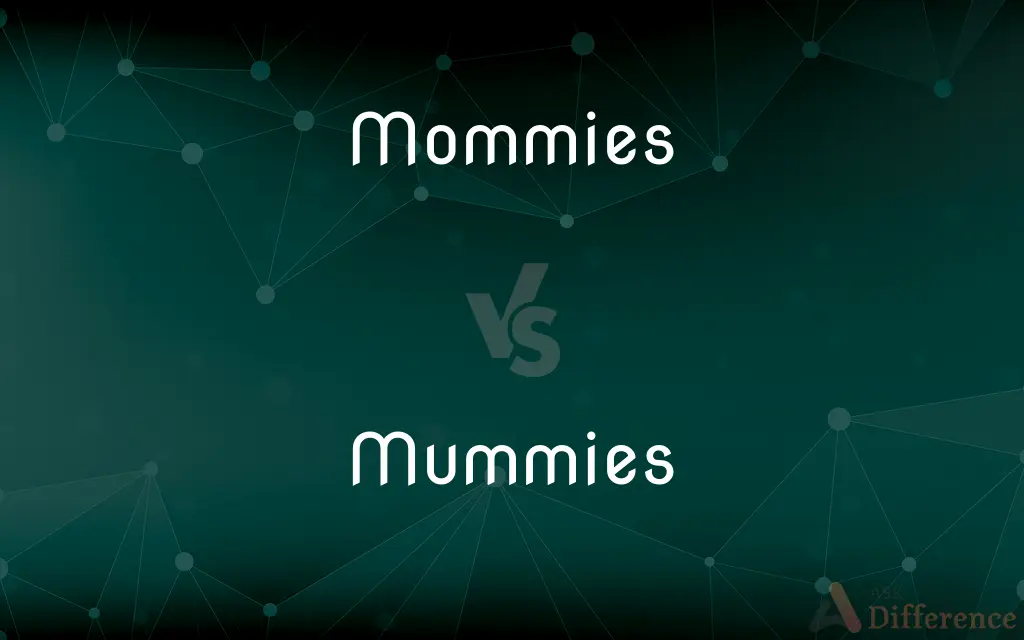Mommies vs. Mummies — What's the Difference?
By Tayyaba Rehman — Published on September 27, 2023
"Mommies" is the plural form of "mommy," referring to mothers, typically used by children. "Mummies" refers to the bodies of people or animals that have been preserved by embalming, typically associated with ancient Egypt.

Difference Between Mommies and Mummies
Table of Contents
ADVERTISEMENT
Key Differences
Mommies is a term usually uttered by young children to refer to their mothers. It’s a tender and affectionate term that signifies a close and loving relationship between a child and their mother. It relates to family, nurture, and care, symbolizing the maternal bond and the warmth and protection associated with motherhood. In contrast, Mummies refer to deceased bodies that have been preserved, either through intentional embalming processes or natural conditions. This term is often associated with ancient civilizations, particularly Egypt, where mummification was practiced to honor the deceased and assure a passage to the afterlife.
The word Mommies, in its everyday use, is laden with emotions and represents the nurturing and loving aspect of family life. It is often used in familial contexts, showcasing the intimate and affectionate bond between a mother and her children. It holds relevance in discussions about family values, parenting, and child development. Meanwhile, Mummies are significant in historical, archaeological, and anthropological discussions. The study of mummies provides insight into ancient practices, beliefs, and lifestyles, offering a glimpse into the customs and values of past civilizations.
In the context of language and its development, Mommies is a colloquial and endearing term that has evolved as part of everyday vernacular, reflecting the social and emotional dimensions of human relationships. It’s a word that resonates with warmth, care, and familial bonds, underscoring the importance of maternal figures in individual lives. On the other hand, the term Mummies has evolved with a focus on historical and scientific exploration, representing the human fascination with the past and the quest to understand ancient cultures and their approaches to death and the afterlife.
Mommies and Mummies, while sounding similar, are worlds apart in meaning and application. The former brings to mind images of loving, caring maternal figures, integral to family units and individual development. The latter conjures images of preserved bodies, ancient tombs, and archaeological discoveries, essential for historical understanding and cultural studies. It’s crucial to discern between the two terms due to their distinct realms of relevance – one residing in the heart of family life and the other in the exploration of bygone civilizations.
Comparison Chart
Definition
Plural form of "mommy," referring to mothers.
Bodies preserved by embalming, often related to ancient civilizations.
ADVERTISEMENT
Context of Use
Familial, affectionate.
Historical, archaeological.
Connotations
Warmth, nurture, love.
Ancient practices, preservation, death.
Field of Study
Parenting, child development.
Archaeology, anthropology, history.
Relevance
Signifies maternal bonds and family relationships.
Offers insights into ancient civilizations and their beliefs.
Compare with Definitions
Mommies
Mommies refers to multiple mothers, often used by young children.
The children and their mommies had a playdate at the park.
Mummies
Mummies are the preserved remains of humans or animals, often associated with ancient Egypt.
Archaeologists discovered several mummies in the newly found tomb.
Mommies
It is a term expressing familial bond and affection towards one’s mother.
The little ones ran to their mommies for a hug.
Mummies
Mummies denote the result of the mummification process, used by several ancient civilizations.
The study of mummies reveals a lot about the beliefs of ancient peoples.
Mommies
Mommies implies a close and loving relationship between a child and their mother.
The kids made handcrafted gifts for their mommies on Mother’s Day.
Mummies
Mummies imply a connection to ancient practices and beliefs regarding death and the afterlife.
The ancient Egyptians made mummies to ensure a safe passage to the afterlife.
Mommies
Mommies denote maternal figures, symbolizing care and protection.
All the mommies in the neighborhood organized a potluck dinner.
Mummies
It refers to bodies embalmed or dried so as to be preserved over time.
The mummies in the museum provide a glimpse into ancient burial practices.
Mommies
It is used to express the loving and nurturing aspect of mothers.
The mommies prepared lunch boxes for the school trip.
Mummies
It represents preserved remains often found in tombs and burial sites.
Some mummies are so well-preserved that scientists can study their tattoos and skin.
Mommies
A mother.
Mummies
The dead body of a human or animal that has been embalmed and prepared for burial, as according to the practices of the ancient Egyptians.
Mommies
Plural of mommy
Mummies
A withered, shrunken, or well-preserved body that resembles an embalmed body.
Mummies
Mother.
Mummies
Plural of mummy
Common Curiosities
Can Mommies be used to address someone who is not a biological mother?
Yes, "Mommies" can be affectionately used to address stepmothers, adoptive mothers, or other maternal figures.
What does the term Mummies typically refer to?
Mummies generally refers to the bodies of deceased people that have been preserved, often through a process involving drying and wrapping the body in cloth.
Are Mummies always Egyptian?
No, while often associated with ancient Egypt, mummification has been practiced in various cultures around the world.
Is Mommies a formal term?
No, "Mommies" is generally considered informal, with "Mothers" being the more formal equivalent.
Can Mommies refer to more than one mother?
Yes, "Mommies" is the plural form and can refer to multiple mothers.
Can Mummies be naturally formed?
Yes, some mummies are formed naturally in environments that inhibit decomposition, such as extreme cold or dry conditions.
What is the primary meaning of Mommies?
Mommies refers to mothers, typically used by children to address their mothers.
Can the word Mommies be used by adults?
Yes, adults might use "Mommies" informally, especially when conversing with young children, or sometimes in a humorous or affectionate manner.
What are some common features identified in Mummies?
Mummies often feature preserved tissues, wrapped linens, and can sometimes be accompanied by burial artifacts.
Are all Mummies wrapped in bandages?
No, not all mummies are wrapped in bandages; the preservation techniques and appearances of mummies can vary widely among different cultures.
Share Your Discovery

Previous Comparison
HD vs. SD
Next Comparison
Timeline vs. TimeframeAuthor Spotlight
Written by
Tayyaba RehmanTayyaba Rehman is a distinguished writer, currently serving as a primary contributor to askdifference.com. As a researcher in semantics and etymology, Tayyaba's passion for the complexity of languages and their distinctions has found a perfect home on the platform. Tayyaba delves into the intricacies of language, distinguishing between commonly confused words and phrases, thereby providing clarity for readers worldwide.















































